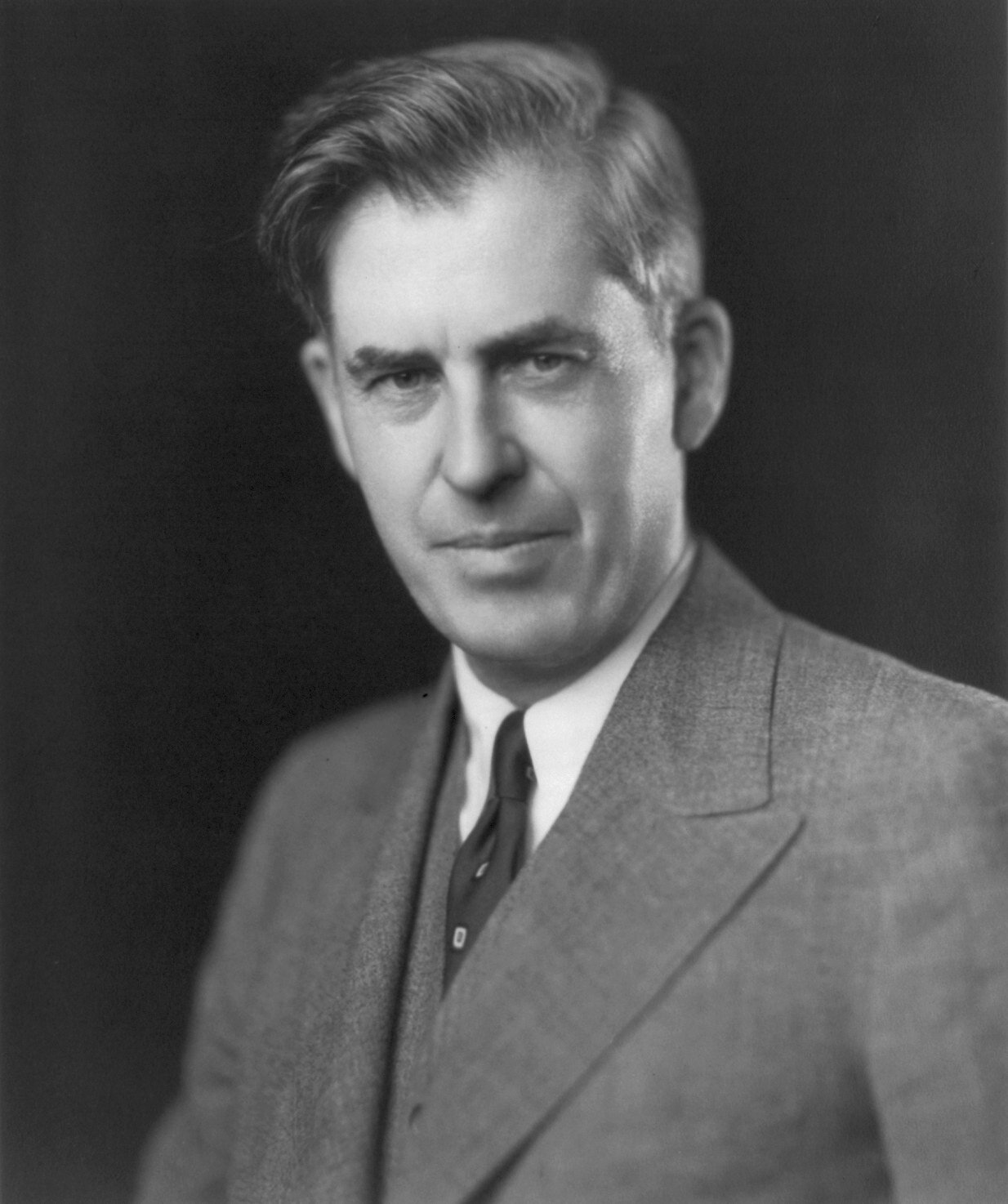The Long View 2008-06-08: None of the Above

Henry Wallace
By Photo copyrighted by D.N. Townsend; no renewal in the U.S. Copyright Office - Library of Congress LC-USZ62-49956 (b&w film copy neg.), uncompressed archival TIFF version (1914 KiB), converted to JPEG (quality level 88) with the GIMP 2.6.6, Public Domain, https://commons.wikimedia.org/w/index.php?curid=7730976
Henry Wallace might have been President at the end of World War II, except that the party had ousted him in 1944 in favor of Truman. Wallace as President would have been quite the coup for the Soviets at the time, as some of of the men he was mooting for Cabinet positions were Soviet agents (Laurence Duggan for State and Harry Dexter White for Treasury). Wallace himself was probably just a useful fool, swept up in the romantic notions that attached to the Soviet Union at the time.
John J. Reilly saw Barack Obama as analogous to Wallace, which seems strange to me. The man who would become the 44th President of the United States was a clear establishment favorite, whereas Wallace was shunted aside when he became inconvenient.
None of the Above
After a while, the names and faces of the political talking heads start to run together, like the identities of the British rock stars of the 1980s, so that you can’t tell one from another. Nonetheless, I do recall that one made this astute remark this week, the week when the Democratic presidential nominating process finally came to an end: both parties, for the first time in living memory, perhaps for the first time ever, have nominated their mavericks. The meaning of this outcome is not that the mavericks are particularly attractive, but that parties’ electorates are trying to reject what their parties have come to be about. The liabilities of the candidates lie precisely in the fact that the parties won’t let them.
Consider Senator John McCain, the Republican candidate apparent. If he wins, it will be on the basis of his realistic views on foreign policy; views happily untainted by foreign-policy Realism. He would have had no trouble at all reaching the White House, had the Bush Administration proceeded less cautiously after 911, and the security situation of the United States had continued on the trajectory of deterioration it had followed throughout the 1990s. A determined, effective approach to the world would in that case have been seen to be urgent. As things stand now, however, McCain faces the irony that Bush’s foreign and military strategies have succeeded beyond their framer’s design. The US is substantially and visibly safer than it was eight years ago, so much so that the delusion reasserts itself that the US is invulnerable, and foreign policy can again be conducted as one aspect of domestic ideological therapy.
On domestic matters, McCain continues the Republican policies of shifting risk to wage earners that ensured the Republican breakthrough in the 1990s would never become electoral dominance.
Consider McCain’s views on health-care system. That system has many problems, but one of the features that made it tolerable was the fact that most people who had a job did not have to worry about health care anymore: health insurance was part of the employment package. That is the one aspect of the system McCain wants to change. The package would become portable, something that people would choose and pay for themselves, a reform that is supposed to introduce more market features into the system. This is a bad idea on several counts. The first is that no sane person really wants health-insurance to be governed by market forces. The federal government, with McCain’s loud approval, just passed a law making it illegal to consider genetic criteria with regard to insurance eligibility, which is precisely the kind of thing that a real “market” system would have to consider. In any case, as I have noted before, a portable insurance system would impose a paperwork burden on individuals comparable to that created by the tax system. Imposing this function on individuals would not be experienced as greater “choice,” or independence; it would be experienced as the addition of new, uncompensated, desperately important work, the kind of thing that sane people pay experts to do for them if they can possibly afford to hire the experts. The proposal is repulsive, yet it is not the only such proposal McCain is making.
Fortunately, I don’t think McCain is really terribly commited to the idea, anymore than he is to the idea of retaining Bush’s demented tax cuts. That’s why I can vote for McCain with a measure of hope.
And what of McCain’s senatorial colleague, Barack Obama, the very Minister of Hope? Readers may recall Henry Wallace, FDR’s vice president from 1941 to 1945, and also the presidential candidate of the Progressive Party in 1948. Wallace had been a perfectly respectable Secretary of Agriculture and of Commerce, and he might well have been vice president at the time of Roosevelt’s death, had not letters come to light showing him to have been a follower of the theosophist Nicholas Roerich, and demonstrating a keen interest in the millenarianism of Shambhallah. (He was not the only statesman at that time who was interested in Tibet, of course.) Wallace’s reputation was ruined not so much by the guru connection, however, as by the fact the Progressive Party by that time was pretty clearly a Communist front, and Wallace refused to repudiate Communist support.
Wallace was not himself a Communist, but his friends and colleagues were fellow travelers, or indeed travelers who had arrived at the Finland Station some time previously. Readers may amuse themselves by drawing parallels between Wallace’s predicament and Obama’s embarrassments with holy men and graying bomb-builders. On the other hand, it is a mark of the decay of the American party system that the Designated Eccentric in this election is not running on a third-party ticket, but as one of the main candidates. It seems to me that Barack Obama is a postmodern Henry Wallace. Obama does not even have a Fatherland of Socialism to front for; instead, his alternative loyalty is a sort of “floating referent,” a frame that can be as easily occupied by environmentalism as by Islamophilia. Like most multiculturalists, his knowledge of the rest of the world as it actually exists seems to be very limited. So is his grasp of current history.
With regard to Iraq, it seems to me that the next president is going to have to deal with three facts:
(1) Not just the Baathist government of Iraq was defeated, which was the original and rather limited American goal in Iraq, but Al Qaeda was defeated and discredited. (2) The US military proved that it is possible to defeat an insurgency without using Russian methods (that is, it is not necessary to pulverize the village to save it). (3) The US now has an experienced and uniquely competent conventional military. That was not obviously the case before 2001, when the US military had a reputation as a dramatic but not very durable special-forces service.
As things stand, though, Obama speaks of visiting Iraq during the electoral campaign in order to facilitate a “careful” withdrawal, like a FEMA inspector coordinating the evacuation of the wounded from a disaster area. Iraq, and the world as a whole, are not going to play to this script.
There is a story about the Clinton White House. Bill Clinton came into office promising to “focus like a laser” on the economy, which, he had assured the electorate, was in a parlous state after 12 years of Republican mismanagement. Economic experts from other countries visited the White House regularly, to brief the staff on new developments in industrial policy. One day in 1994, however, the staffers looked up from their yellow pads when they realized that the day’s speaker, an economist from Germany, was lamenting, not their country’s economy, but his own. His greatest wish was to apply Reaganite deregulation to Europe, since it certainly seemed to be working in the US. Thereafter, the Clinton Administration began to defend itself in terms of the splendid state of the economy, rather than using economic underperformance as an explanation for why the Republicans must never again occupy the White House.
A President Obama might have a similar moment about foreign policy. It would be very hard to reverse the real gains of the last eight years. Even a show of naïveté toward Iran would have the effect of further consolidating the region against that country. That would not have happened before the elimination of the Baathist government in Iraq. The structure of the region is different.
On the whole, I look forward to the campaign. One suspects both of the candidates of having read many of the books I have read. Even better, both candidates seem incapable of staying on point. Listening to them talk and debate will be a great relief after so many years in which most presidential candidates have sounded like simple chatterbots running on glitched operating systems.
Things could easily be worse.
Copyright © 2008 by John J. Reilly



Comments ()